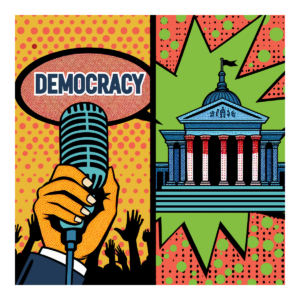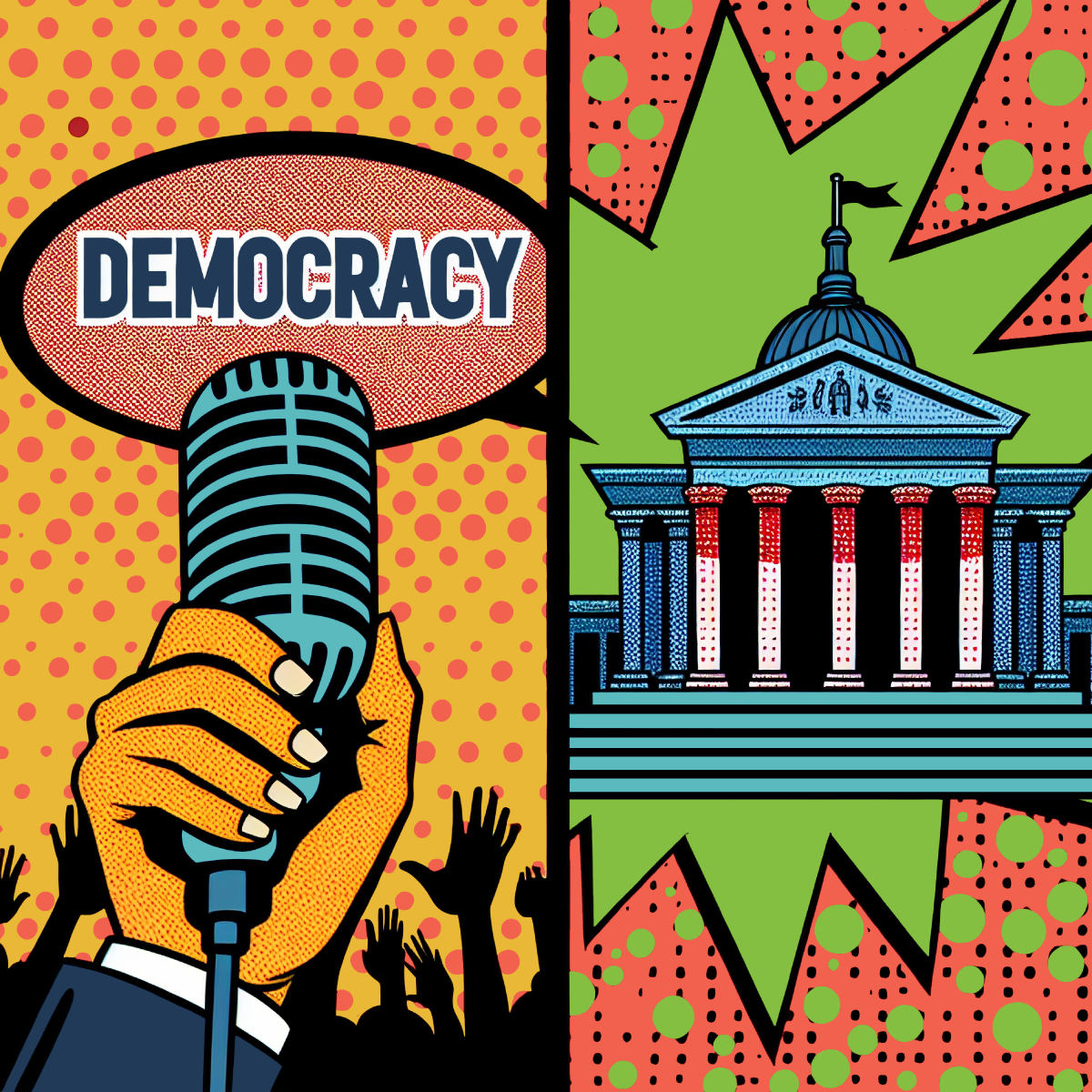 The concept of advancing democracy within education frequently intertwines with the notion of rigor. Traditionally, rigor has been mistakenly associated with the mere increase in difficulty—more complex texts, higher cognitive demands, and additional workloads without the necessary support.
The concept of advancing democracy within education frequently intertwines with the notion of rigor. Traditionally, rigor has been mistakenly associated with the mere increase in difficulty—more complex texts, higher cognitive demands, and additional workloads without the necessary support.
→ What if rigor is less about piling on complexity and more about fostering student agency?
→ What if rigor is a democratic process where students have voice, choice, and the assessment capabilities needed to navigate their learning?
Re-envisioning rigor through the lens of democratic practices reveals that it fundamentally concerns fostering student agency rather than simply pushing students to work harder. When rigor is shaped as a democratic process, students engage actively and are equipped with the assessment capabilities necessary to navigate their learning effectively (Storey et al., 2021).
John Hattie’s (2023) research on assessment-capable learners offers a powerful entry point into this conversation. When students know where they are in their learning, where they are going, and what they need to do to get there, they become agents of their progress and success. These attributes align profoundly with democratic education principles, which emphasize active participation and critical engagement rather than passive reception of knowledge (Storey et al., 2021).
Assessment Capability as a Democratic Practice
A truly democratic school doesn’t just teach about democracy—it practices it. Advancing democracy in schools requires schools to create opportunities for students to: take ownership of the learning process, engage in critical discourse about their learning, and co-construct the learning experience with their teacher and each other. Assessment capability is central to this shift. The empowerment of students through assessment involves multiple layers of engagement.
When students are assessment-capable, they:
- Set meaningful goals based on clear learning intentions and success criteria.
- Seek, receive, and use feedback to improve their work.
- Engage in self- and peer-assessment to calibrate their understanding.
- Advocate for their needs and adjust their learning strategies
These “learning to learn skills” advance student agency and echo democratic ideals of self-governance and responsibility, framing assessment for learning not only as a tool for learning but as a practice that fosters a community of learners collaborating towards common goals (Nieminen & Tuohilampi, 2020). Assessment for learning is transparent and learner-centered; it cultivates a classroom culture where learners see themselves as contributors, not just consumers.
Re-Envisioning Rigor through the Impact Team Model
The Impact Team Model (2023), as developed by Paul J. Bloomberg and Barb Pitchford, provides a collaborative structure for advancing rigor in ways that align with assessment capability and democratic schooling. It shifts the focus from teacher-led instruction to shared inquiry, where teachers and students engage in cycles of formative assessment to deepen learning.
In this model, rigor is re-envisioned as:
- Student-Driven Inquiry: Students participate in embracing goals driven by priority standards, co-constructing success criteria, and analyzing evidence of their learning.
- Collaborative Assessment Practices: Teachers and students engage in learning huddles to examine student work and determine next steps together.
- Reflection and Metacognition: Through structured opportunities for self-reflection, students refine their learning goals and develop a sense of efficacy.
By embedding these practices, rigor is no longer about pushing harder but about thinking more deeply. The Impact Team approach encourages human-centered partnerships in formative assessment cycles where both students and teachers collaboratively analyze work and outline next steps based on common goals (Winkle et al., 2011). By embracing these collaborative teaching and learning structures, the perception of rigor shifts from a compliance-oriented framework to one that fosters genuine engagement, inspiring critical thought and deeper inquiry (Rasmy et al., 2022). This ensures that students experience rigor as an engaging, intellectually rich process rather than a series of punitive obstacles.
Building a Culture of Democratic Learning with Assessment Capability
The infusion of assessment capability and the Impact Team Model helps establish a culture of democratic learning. As students and teachers co-own the educational process, the rigorous pursuit of knowledge transforms from an externally imposed burden to a shared journey, instilling a sense of agency in learners.
- Students co-own the learning process through clear learning targets and reflective assessment practices.
- Teachers become facilitators of inquiry rather than sole gatekeepers of knowledge.
- Rigor is a shared journey rather than an externally imposed challenge.
In this vision, rigor is not about compliance but about engagement. It’s about students knowing how to think critically, evaluate evidence, and make informed decisions—skills essential not only for academic success but also for active participation in a democratic society. This collaborative environment not only enriches the learning experience but also enhances the preparation of students for active citizenship in democratic societies, where critical thought and informed decision-making are essential (Prasad et al., 2024).
From Rigor to Agency: Challenge, Choice, and Co-Creation
If we truly believe in the power of schools as democratic spaces, we must cultivate assessment-capable learners as the foundation for rigor. Impact Teams ground their practices in assessment-capable frameworks and collaborative models to ensure that rigor is synonymous with engagement, empowerment, and student ownership. The Impact Team Model provides the collaborative structure to make this shift, ensuring that students are not just learning in rigorous environments but are co-creating them in partnership with their teachers and peers.
Let’s move beyond outdated notions of rigor and toward a vision where challenge and choice coexist, where assessment and feedback fuel empowerment, and students are not just recipients of education but architects of their own learning journeys.
Click here to discuss how Impact Teams can support your school/system.
References:
- Bloomberg, P., & Pitchford, B. (2023). Leading Impact Teams: Building a Culture of Efficacy and Agency. Mimi and Todd Press.
- Bloomberg, P., Vandas, K., Twyman, I., Dukes, V., Carrillo Fairchild, R., Hamilton, C., & Wells, I. (2022). Amplify Learner Voice Through Culturally Responsive and Sustaining Assessment. Mimi and Todd Press.
- Hattie, J. (2023). Visible Learning: The Sequel. Routledge. https://doi.org/10.4324/9781003380542
- Nieminen, J. and Tuohilampi, L. (2020). ‘Finally Studying for Myself’ – Examining Student Agency in Summative and Formative Self-Assessment Models. Assessment & Evaluation in Higher Education, 45(7), 1031-1045. https://doi.org/10.1080/02602938.2020.1720595
- Prasad, S., O’Malley, C., Tailor, M., Rajput, V., & Fine, L. (2024). An Interprofessional Interactive Case-Based Discussion Session for Healthcare Professions Students. https://doi.org/10.21203/rs.3.rs-3876390/v1
- Rasmy, A., St‐Amand, J., Nabil, A., & Courdi, C. (2022). Improving the Effectiveness of Teacher Assessment in Higher Education: A Case Study of Professors’ Perceptions in Morocco. https://doi.org/10.21203/rs.3.rs-1942986/v2
- Storey, A., Eckel-Sparrow, H., & Ransdell, H. (2021). Cultivating Student Agency and Responsibility Through Peer-to-Peer Teaching. International Journal for Students as Partners, 5(1), 97-106. https://doi.org/10.15173/ijsap.v5i1.4478
- Winkle, L., Fjortoft, N., & Hojat, M. (2011). Validation of an Instrument to Measure Pharmacy and Medical Students’ Attitudes Toward Physician-Pharmacist Collaboration. American Journal of Pharmaceutical Education, 75(9), 178. https://doi.org/10.5688/ajpe759178



